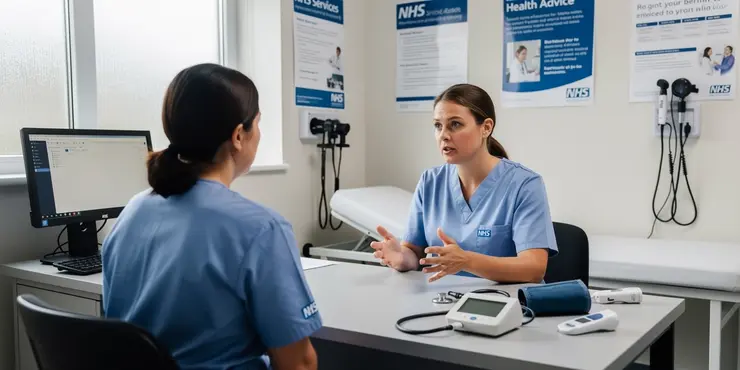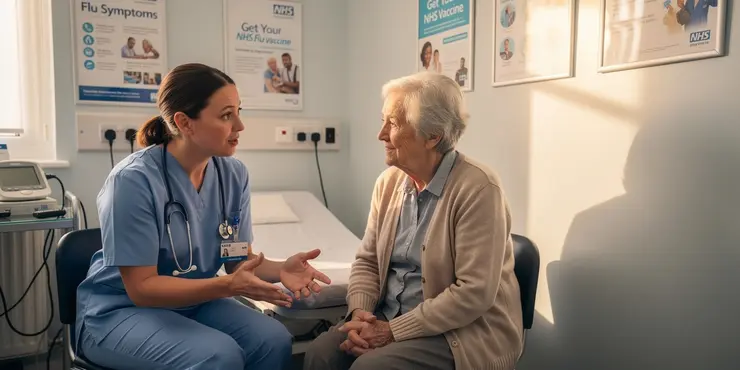Find Help
More Items From Ergsy search
-

Treating flu (influenza)
Relevance: 100%
-

Symptoms of flu (influenza)
Relevance: 84%
-

Can the flu jab give you the flu?
Relevance: 58%
-

Can animals get Super Flu?
Relevance: 56%
-

How is Super Flu diagnosed?
Relevance: 55%
-

What is Super Flu?
Relevance: 55%
-

What causes Super Flu?
Relevance: 54%
-

Can Super Flu cause a pandemic?
Relevance: 54%
-

Is the Super Flu contagious?
Relevance: 54%
-

Has Super Flu occurred in the past?
Relevance: 54%
-

Can the flu vaccine give you the flu?
Relevance: 53%
-

What is the H3N2 flu strain?
Relevance: 52%
-

Flu can be fatal
Relevance: 52%
-

How effective is the flu vaccine?
Relevance: 52%
-

Can H3N2 be treated with antiviral medications?
Relevance: 52%
-

Is the flu jab necessary for healthy individuals?
Relevance: 51%
-

Can Super Flu be prevented by vaccines?
Relevance: 51%
-

Is H3N2 more dangerous than other flu strains?
Relevance: 51%
-

Can the flu jab give me the flu?
Relevance: 51%
-

Can the flu vaccine give me the flu?
Relevance: 50%
-

Is Super Flu a new strain of virus?
Relevance: 50%
-
Does the flu vaccine protect against COVID-19?
Relevance: 50%
-

What is the winter flu jab?
Relevance: 50%
-

Why does H3N2 often lead to more severe flu seasons?
Relevance: 49%
-

What treatments are available for Super Flu?
Relevance: 49%
-

Just the flu? | NHS
Relevance: 49%
-

How often does Super Flu occur?
Relevance: 48%
-

Is the winter flu jab effective against all flu strains?
Relevance: 48%
-

How important is it to get a flu vaccine in 2026?
Relevance: 48%
-

How does the winter flu jab work?
Relevance: 48%
-

Will getting the flu jab protect me against COVID-19?
Relevance: 48%
-

Understanding Seasonal Flu: Prevention and Treatment
Relevance: 47%
-

Can pregnant women get the flu vaccine?
Relevance: 47%
-

Who should get the winter flu jab?
Relevance: 46%
-

Current Flu Vaccination Recommendations and Availability
Relevance: 46%
-

Can children receive the flu vaccine as a nasal spray?
Relevance: 46%
-

Can lifestyle changes help prevent Super Flu?
Relevance: 45%
-

Can I still get the flu if I have been vaccinated?
Relevance: 45%
-

How long does protection from the flu jab last?
Relevance: 45%
-

What are the symptoms of Super Flu?
Relevance: 44%
Effective Ways to Treat Flu (Influenza) in the United Kingdom
Rest and Hydration
The cornerstone of flu treatment is rest and hydration. Influenza can cause significant fatigue, so it's crucial to get ample rest to help your body fight the virus. Maintaining hydration by drinking plenty of fluids, such as water, herbal teas, and broths, helps to keep mucous membranes moist and can alleviate congestion. Avoid caffeine and alcohol as they can cause dehydration.Over-the-Counter Medications
Over-the-counter (OTC) medications can help relieve flu symptoms. Paracetamol or ibuprofen can reduce fever and alleviate aches and pains. It's essential to follow the dosage instructions, especially for children and older adults. Decongestants and antihistamines can help with nasal congestion and runny nose but consult a pharmacist about which types are safe and suitable for you.Antiviral Medications
In some cases, your GP may prescribe antiviral medications like oseltamivir (Tamiflu) or zanamivir (Relenza). These medications can reduce the severity and duration of symptoms, particularly if taken within the first 48 hours of symptom onset. Antivirals are especially beneficial for high-risk groups, including the elderly, pregnant women, and individuals with chronic illnesses.Home Remedies
Home remedies can also provide symptom relief. A mixture of honey and lemon in hot water can soothe a sore throat and suppress coughs. Inhaling steam from a bowl of hot water can relieve nasal congestion. Adding a few drops of eucalyptus oil to the water may enhance this effect. These remedies can be comforting and supplement OTC medications but should not replace medical treatments.Preventive Measures
The best approach to managing flu is prevention. Annual flu vaccinations are available through the NHS and are recommended, especially for high-risk groups. Good hygiene practices, such as regular hand washing with soap and water, using tissues when coughing or sneezing, and avoiding close contact with infected individuals, can significantly reduce the spread of the virus.When to Seek Medical Help
While most flu cases can be managed at home, certain symptoms warrant medical attention. Seek help if you experience difficulty breathing, persistent chest pain, severe weakness, or confusion. Vulnerable populations, including young children, elderly adults, and those with chronic health conditions, should contact a healthcare provider promptly if they suspect flu infection. By following these guidelines, individuals in the United Kingdom can effectively manage flu symptoms and promote a quicker recovery. Always consult healthcare professionals for personalized advice and treatment.How to Treat the Flu in the United Kingdom
Rest and Drink Fluids
When you have the flu, you need to rest a lot. This helps your body fight the sickness. Drink lots of fluids like water, herbal tea, and soup. This keeps you from getting dehydrated and helps your nose feel less blocked. Stay away from drinks with caffeine and alcohol because they can dry you out.Medicines from the Shop
You can buy medicines at the shop to help with flu symptoms. Paracetamol and ibuprofen can help make you feel better by reducing fever and pain. Always read the instructions for how much to take. Ask a pharmacist which decongestants or antihistamines are safe for you if your nose is stuffy or runny.Medicines from the Doctor
Sometimes, the doctor might give you medicine like Tamiflu or Relenza. These can make the flu get better faster if you take them quickly after getting sick. These are especially helpful for older people, pregnant women, and people with other health problems.Home Tips
You can try simple things at home to feel better. Warm water with honey and lemon can help a sore throat and a cough. Breathing in steam from hot water can help your nose feel better, too. Adding a bit of eucalyptus oil can make it work even better. These can help, but they shouldn't replace medical treatments you need.Stop the Flu from Spreading
It's best to not get the flu at all. Get your flu vaccine every year. Wash your hands well with soap and water. Use tissues when you cough or sneeze. Stay away from people who are sick to avoid catching the flu.When to See the Doctor
Most of the time, you can get better from the flu at home. But, if you have trouble breathing, bad pain in your chest, feel very weak, or confused, see a doctor. This is especially important for young kids, older adults, and people with other health problems. By following these tips, people in the UK can take care of themselves when they have the flu. Always talk to a doctor or nurse for the best advice for you.Frequently Asked Questions
What are the symptoms of the flu?
The flu typically causes sudden fever, aching muscles, chills and sweats, headache, dry cough, fatigue and weakness, nasal congestion, and sore throat.
How can I differentiate flu from a common cold?
Flu symptoms are typically more severe and start suddenly, while cold symptoms are usually milder and develop gradually. Fever is more common with the flu.
When should I see a doctor for the flu?
See a doctor if you have a high fever that doesn't come down, difficulty breathing, chest pain, severe weakness, confusion, or worsening symptoms. Also, seek medical advice if you're in a high-risk group.
How is the flu treated?
Treatment focuses on relieving symptoms. This includes rest, hydration, and over-the-counter medications like paracetamol or ibuprofen. Antiviral drugs may be prescribed in some cases.
Are antibiotics effective in treating the flu?
No, antibiotics are not effective against the flu because it is caused by a virus, not bacteria.
How long does the flu usually last?
Flu symptoms typically last from a few days to less than two weeks, but some symptoms like fatigue can last longer.
Can I go to work or school if I have the flu?
It's best to stay home to rest and to avoid spreading the virus to others. Generally, you should stay home until at least 24 hours after your fever is gone.
How can I prevent getting the flu?
The best way to prevent the flu is to get the annual flu vaccine. Additionally, practising good hygiene like frequent hand washing, and avoiding close contact with sick individuals can help.
Who is at higher risk for severe flu complications?
High-risk groups include young children, elderly people, pregnant women, and individuals with certain chronic medical conditions such as asthma, diabetes, or heart disease.
Is it safe to get the flu vaccine during pregnancy?
Yes, it is safe and recommended to get the flu vaccine during pregnancy. It protects both the mother and the unborn baby.
Can the flu vaccine give me the flu?
No, the flu vaccine cannot give you the flu. The flu vaccines used in the UK do not contain live viruses.
Is the nasal spray flu vaccine available for children in the UK?
Yes, the nasal spray flu vaccine is available for children aged 2 to 17 years old in the UK.
Can flu be serious for healthy adults?
While most healthy adults will recover without complications, flu can lead to serious illnesses such as pneumonia, which can be severe.
Are there any side effects of the flu vaccine?
Common side effects are mild and can include soreness at the injection site, low fever, and muscle aches. Serious side effects are rare.
Does the flu vaccine protect against all flu viruses?
The flu vaccine is designed to protect against the most common and severe strains predicted for the flu season. It may not protect against all strains but can reduce the severity of illness.
What happens when you have the flu?
The flu is a sickness. It can make you feel very tired and weak. Here are some things that might happen if you have the flu:
- You might feel hot or cold. This is called a fever.
- You might cough a lot.
- Your nose might be runny or it might be hard to breathe through your nose.
- You might have a sore throat. This means your throat hurts.
- Your head might hurt. This is called a headache.
- Your body might ache. This means your muscles hurt.
- You might feel very tired and want to sleep a lot.
If you think you have the flu, it is good to see a doctor. They can help you feel better.
Here are some things that can help if you have the flu:
- Drink lots of water or juice.
- Get plenty of rest.
- Stay warm with a blanket.
- Ask an adult for some medicine that can help with the flu.
The flu can make you feel sick quickly. You might get a high temperature (fever). Your muscles might hurt. You could feel cold and sweaty. You might get a headache. You may have a dry cough and feel tired and weak. Your nose might get blocked, and your throat could be sore.
Here are some things that can help if you have the flu:
- Rest a lot.
- Drink plenty of water.
- Take medicine to lower fever and pain (ask an adult or doctor first).
- Use a humidifier to help with a sore throat and blocked nose.
How do I know if I have the flu or a cold?
It can be hard to tell if you have the flu or just a cold. Here are some things to look for:
- Flu: You might feel very tired, have a fever, and your body might ache. You can also have a cough.
- Cold: You might have a runny or stuffy nose, sneeze a lot, or have a sore throat.
If you feel really sick, tell an adult. It’s good to ask a doctor too. They can help you feel better.
Some ways to help when you're sick:
- Rest a lot.
- Drink water or juice.
- If you are hot, tell someone to help cool you down.
If reading is hard, ask someone to read it with you.
Flu symptoms are usually worse and start quickly. Cold symptoms are not as bad and happen slowly. You are more likely to have a fever with the flu.
When should I see a doctor for the flu?
If you feel very sick, go to the doctor. Here are some signs to look for:
- Your breathing is hard or painful.
- You are not drinking enough and feel thirsty.
- You are confused or very sleepy.
- Your fever does not go down.
If you are worried, it is okay to ask for help. You can use a thermometer to check your temperature or ask someone for advice.
Go to the doctor if:
- You have a high fever that won't go away.
- It's hard to breathe.
- Your chest hurts.
- You feel very weak.
- You feel confused.
- Your symptoms are getting worse.
If you are in a group that needs extra care, ask a doctor for advice.
How do you get better from the flu?
When you have the flu, there are ways to feel better:
- Rest: Make sure to get lots of sleep.
- Drink: Have plenty of water and juice.
- Meds: You can take medicine if a doctor says it's okay.
You can ask an adult to help you. They might use a thermometer to check your temperature. If you feel very sick, see a doctor.
Treatment helps you feel better. You should rest and drink lots of water. You can take medicine you buy from the shop, like paracetamol or ibuprofen. Sometimes, the doctor might give you special medicine to fight the virus.
Do antibiotics help get rid of the flu?
Doctors often give antibiotics to help people get better from an illness. But antibiotics do not work for the flu. The flu is caused by a virus, and antibiotics only kill bacteria, not viruses.
If you have the flu, you can rest, drink lots of water, and stay warm. These things help you feel better.
It can also help to ask someone you trust to explain this to you. Using pictures or simple charts can make it easier to understand why antibiotics don't work for the flu.
No, antibiotics do not work for the flu. The flu is caused by a tiny germ called a virus. Antibiotics only work for a different kind of germ called bacteria.
How long does the flu last?
When you have the flu, you feel sick for a few days or up to two weeks. Some things, like feeling very tired, might last a little longer.
Can I go to work or school if I have the flu?
If you have the flu, it's best to stay home. This can help you feel better and stop the flu from spreading to others.
Here are some things you can do to feel better:
- Rest a lot.
- Drink water or juice.
- Take medicine if you need it. Ask a grown-up or doctor first.
Ask an adult if you need help or have questions.
It is best to stay at home. Rest and avoid getting others sick. Stay home until your fever is gone for 1 day.
How can I stop from getting the flu?
The best way to stop the flu is to get the flu shot every year. Also, it's good to wash your hands often and stay away from people who are sick.
Who is more likely to get very sick from the flu?
Some people have a higher chance of getting sick. These people include young children, older people, women who are having a baby, and people who have certain health problems like asthma, diabetes, or heart disease.
Is it okay to get the flu shot when you are pregnant?
Yes, it is safe to get the flu shot when you are going to have a baby. The flu shot helps keep you and your baby healthy.
If you have questions, you can ask a doctor or nurse about it. They can give you more information.
Some people use pictures or videos to understand better. You can try that too!
Yes, it is safe to get the flu shot when you are going to have a baby. Getting the shot helps keep both you and your baby healthy.
Can the flu shot make me sick?
No, the flu shot cannot give you the flu. The flu shots used in the UK do not have live germs in them.
Can children in the UK get the nose spray flu vaccine?
Yes, children in the UK can get a flu vaccine as a nose spray. This spray helps protect against getting sick from the flu.
If you have questions, you can:
- Ask a doctor or nurse for help
- Look for easy-to-read leaflets
- Watch videos that explain the vaccine
Yes, children in the UK who are 2 to 17 years old can get the flu vaccine as a nasal spray.
Can the flu be bad for healthy grown-ups?
Most healthy grown-ups get better from the flu without problems. But sometimes, the flu can cause a bad sickness called pneumonia. Pneumonia can be serious.
Here are some tips to help:
- Use a dictionary to look up hard words.
- Ask someone to read with you.
- Use reading apps that read aloud.
Does the flu shot have any side effects?
Most people don't get sick after the vaccine. You might feel a little sore where you got the shot. Some people also get a small fever or their muscles hurt a bit. Serious problems are very rare.
Does the flu shot stop all flu germs?
The flu shot helps keep you safe from most flu germs, but not all of them. It works well against the most common flu germs each year.
To stay healthy, wash your hands a lot and cover your mouth when you sneeze or cough.
If it is hard to read or understand this, you can ask someone to help you or use a tool that reads the text out loud.
The flu shot helps protect you from the flu. It works against the strongest and most common flu bugs we expect this year. It might not stop every flu bug, but it can help you not get as sick.
If you find reading hard, try asking someone to read it with you or use an app that reads out loud.
Useful Links
This website offers general information and is not a substitute for professional advice.
Always seek guidance from qualified professionals.
If you have any medical concerns or need urgent help, contact a healthcare professional or emergency services immediately.
Some of this content was generated with AI assistance. We’ve done our best to keep it accurate, helpful, and human-friendly.
- Ergsy carfully checks the information in the videos we provide here.
- Videos shown by Youtube after a video has completed, have NOT been reviewed by ERGSY.
- To view, click the arrow in centre of video.
- Most of the videos you find here will have subtitles and/or closed captions available.
- You may need to turn these on, and choose your preferred language.
- Go to the video you'd like to watch.
- If closed captions (CC) are available, settings will be visible on the bottom right of the video player.
- To turn on Captions, click settings .
- To turn off Captions, click settings again.
More Items From Ergsy search
-

Treating flu (influenza)
Relevance: 100%
-

Symptoms of flu (influenza)
Relevance: 84%
-

Can the flu jab give you the flu?
Relevance: 58%
-

Can animals get Super Flu?
Relevance: 56%
-

How is Super Flu diagnosed?
Relevance: 55%
-

What is Super Flu?
Relevance: 55%
-

What causes Super Flu?
Relevance: 54%
-

Can Super Flu cause a pandemic?
Relevance: 54%
-

Is the Super Flu contagious?
Relevance: 54%
-

Has Super Flu occurred in the past?
Relevance: 54%
-

Can the flu vaccine give you the flu?
Relevance: 53%
-

What is the H3N2 flu strain?
Relevance: 52%
-

Flu can be fatal
Relevance: 52%
-

How effective is the flu vaccine?
Relevance: 52%
-

Can H3N2 be treated with antiviral medications?
Relevance: 52%
-

Is the flu jab necessary for healthy individuals?
Relevance: 51%
-

Can Super Flu be prevented by vaccines?
Relevance: 51%
-

Is H3N2 more dangerous than other flu strains?
Relevance: 51%
-

Can the flu jab give me the flu?
Relevance: 51%
-

Can the flu vaccine give me the flu?
Relevance: 50%
-

Is Super Flu a new strain of virus?
Relevance: 50%
-
Does the flu vaccine protect against COVID-19?
Relevance: 50%
-

What is the winter flu jab?
Relevance: 50%
-

Why does H3N2 often lead to more severe flu seasons?
Relevance: 49%
-

What treatments are available for Super Flu?
Relevance: 49%
-

Just the flu? | NHS
Relevance: 49%
-

How often does Super Flu occur?
Relevance: 48%
-

Is the winter flu jab effective against all flu strains?
Relevance: 48%
-

How important is it to get a flu vaccine in 2026?
Relevance: 48%
-

How does the winter flu jab work?
Relevance: 48%
-

Will getting the flu jab protect me against COVID-19?
Relevance: 48%
-

Understanding Seasonal Flu: Prevention and Treatment
Relevance: 47%
-

Can pregnant women get the flu vaccine?
Relevance: 47%
-

Who should get the winter flu jab?
Relevance: 46%
-

Current Flu Vaccination Recommendations and Availability
Relevance: 46%
-

Can children receive the flu vaccine as a nasal spray?
Relevance: 46%
-

Can lifestyle changes help prevent Super Flu?
Relevance: 45%
-

Can I still get the flu if I have been vaccinated?
Relevance: 45%
-

How long does protection from the flu jab last?
Relevance: 45%
-

What are the symptoms of Super Flu?
Relevance: 44%


